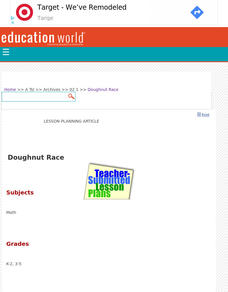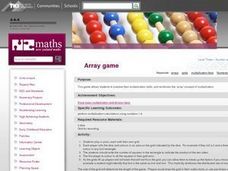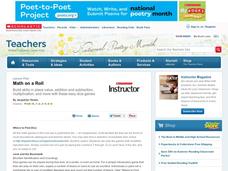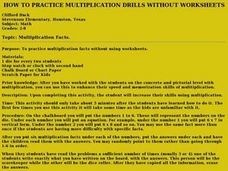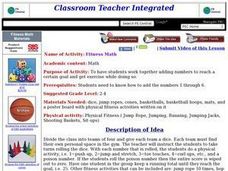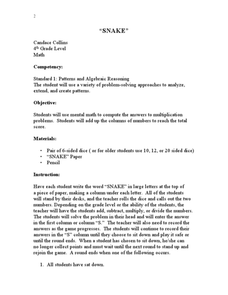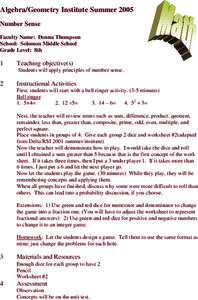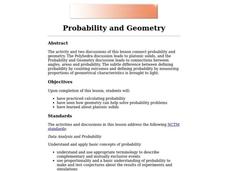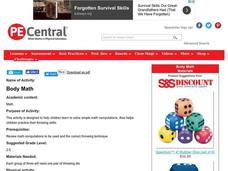World Wildlife Fund
Take 6
Investigate the various properties of the number six with this elementary math lesson. From simple addition, subtraction, multiplication, and division problems to the creation of hexagonal tessellations, this lesson covers all aspects of...
Curated OER
Doughnut Race
Pupils will practice math facts in this fast-paced and fun "Doughnut Race." This fun activity has learners practice their math facts in a face paced game environment. It can be adapted to all mathematical operations by using a poster...
Curated OER
Array game
Second graders participate in a math game that allows the students to practice their multiplication skills, and reinforces the 'array' concept of multiplication. They perform multiplication calculations using numbers one to six and...
Curated OER
Math Fact Card Games
Learners play card games as a way to strengthen their math skills. In this math facts lesson, students play UNO multiplication, greater than and less then and multiplication war.
Curated OER
Fast Facts
Ever use the inner circle/outer circle method of learning? Placing learners in a stationary inner circle and a rotating outer circle, they roll a die and attempt to be the first to call out an addition or multiplication equation with the...
Curated OER
Dice War
Students play a math game. In this operations lesson, students play a game called dice war, where they practice their multiplication, addition, and subtraction skills.
Curated OER
Introduction to Exponents
Problem solve using exponents. Pupils read One Grain of Rice: A Mathematical Folktale and write powers to represent amounts from the story.They compare actual solutions to their predictions and play a game to practice using exponents.
Curated OER
Race to the Top-Multiplication Game
Learners practice multiplication facts with a multiplication game. In this multiplication lesson plan, students roll dice and multiply the numbers shown and color in that number. The first student to the top wins.
Curated OER
Multiplication Football
Third graders write out the multiplication facts of six; repeating them aloud. They then play a makeshift football game. They draw the field on construction paper and use figurines to represent players. They roll the dice to determine...
Curated OER
Math on a Roll
Students practice various math skills using a polyhedral die. In this dice game lesson, students practice multiplication, addition, place value, and money using games. Standard dice may be used instead of a polyhedral die with...
Curated OER
How to Practice Multiplication Drills Without Worksheets
Students practice their multiplication facts without the use of worksheets. They participate in an activity practicing their facts using a die. They record their progress and the game is adjusted as their level increases.
Curated OER
Fitness Math
Learners participate in physical fitness activities. They role a dice and perform the activity associated with the dice number. Activities include push ups, toe touches, curl ups, jump rope, jumping jacks, sit-ups, and shooting a...
Curated OER
A Math Game for Reinforcing Computation Skills
Students practice a variety of math skills. In this math computation lesson, students follow the rules of the game and keep track of their own scores. Students review skills for addition, subtraction, multiplication and division.
Curated OER
Math Activity: "Snake"
Fourth graders explore patterns by participating in a class math activity. In this early algebra lesson, 4th graders utilize a die and chart to keep record of a snake game in which students must utilize a math function to solve a problem...
Curated OER
Number Sense
Eighth graders participate in a lesson that is concerned with reviewing basic math concepts using the four operations. The activity is composed of a math game that is played by them.
Curated OER
Linear Equations
Students discover the equation of a line. They accurately record data collected from the game, "You're On A Roll", create number sentences by rolling dice, and choose their own values for the multiplication and addition steps.
Curated OER
Factor Fun for Fifth Graders
Fifth graders explore common factors. In this factorization lesson, 5th graders discover the greatest common factor among two numbers in a game format. Students build on previous knowledge to determine the greatest common factor.
Curated OER
Probability and Geometry
Students explore the ways Geometry can help solve probability problems. Students describe platonic solids and practice calculating probability using an online resource. They construct dice with various numbers of sides to demonstrate...
Curated OER
Math + Fitness = FUN
Learners play a game wherein they role 2 dice and calculate either the sum, difference or product of the numbers and the answer is the number of exercises they do. They change stations to do different exercises or skills.
Curated OER
Fact-O!
Students practice math facts as they play a game of chance and skill. They correctly create and calculate mathematical equations, using the numbers rolled on three dice, and earn points for marking adjacent numbers on the game sheet.
Curated OER
PIG/HOG - Activity
Students play PIG, which is an addition game, played between two or more students (but they CAN play alone!). The first player rolls the 6-sided, pip dice. They add up the total by counting the pips, using their fingers.
Curated OER
Patterns, Functions & Algebra
Young scholars participate in numerous activities and games. In pairs, they play card games to find relationships between a random set of playing cards. After writing samples of Dear Abby letters concerning math problems, students...
Curated OER
Body Math
Students solve simple math computations while practice their throwing skills. They explore how to subtract, add,divide,and multiply, while playing a fun fitness oriented game.
Curated OER
From Probability to Combinatorics and Number Theory
Students see how division is used to help solve probability problems. They use tables as data structures where they are used to count outcomes and to compute probabilities. Students use games to help solve probability problems.



